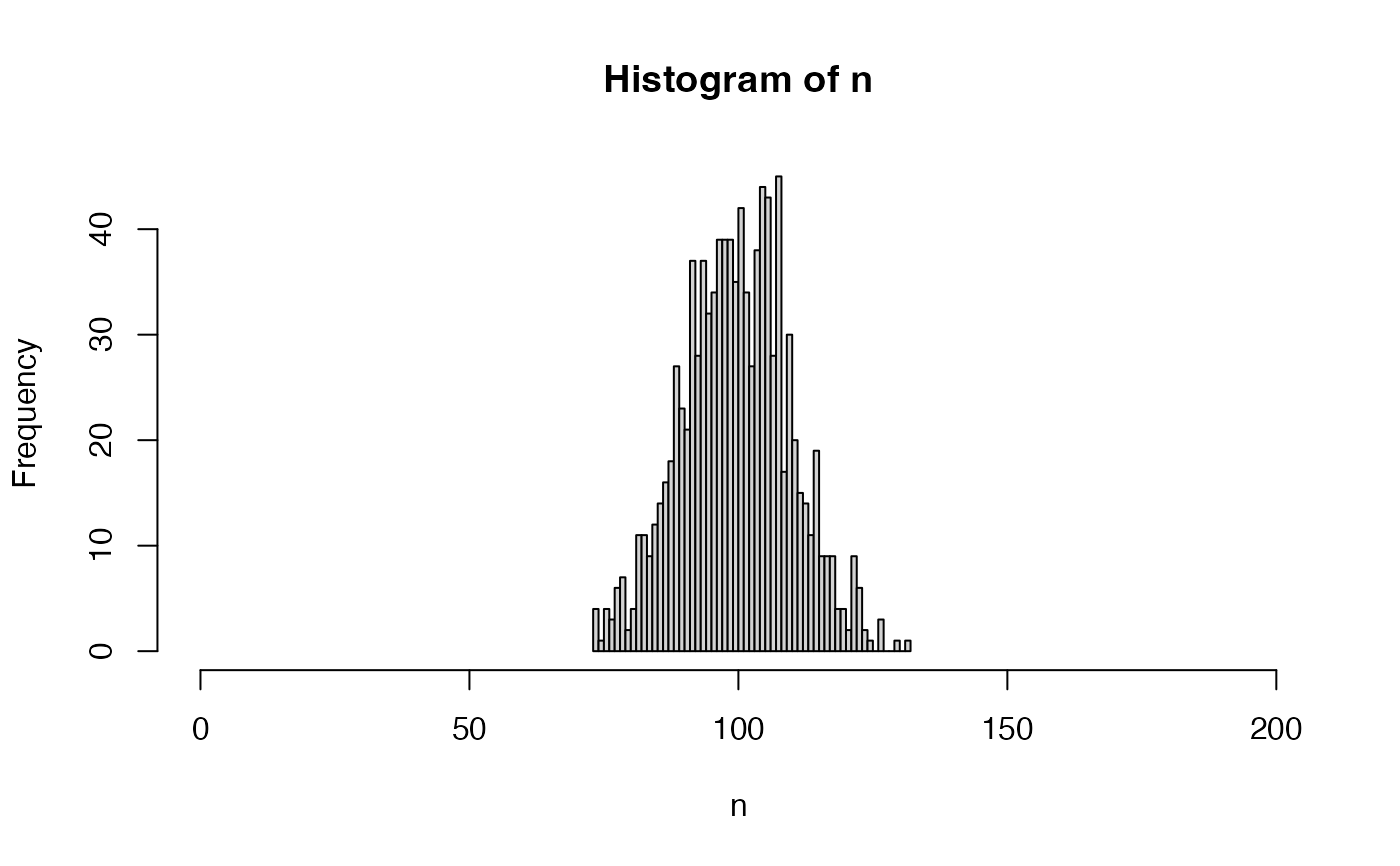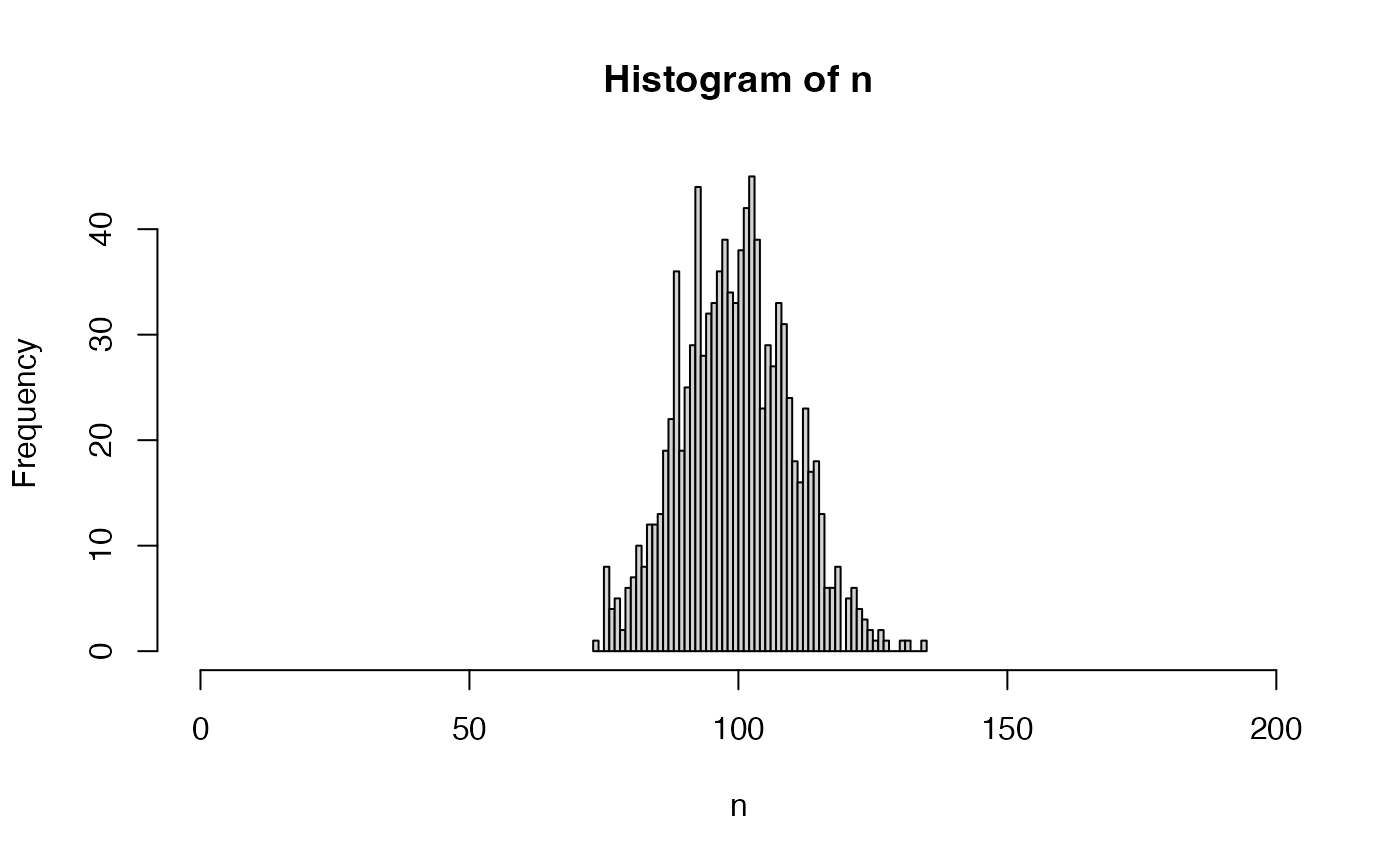Sample a number of drones - used when nDrones = NULL
(see SimParamBee$nDrones).
This is just an example. You can provide your own functions that satisfy your needs!
nDronesPoisson(x, n = 1, average = 100)
nDronesTruncPoisson(x, n = 1, average = 100, lowerLimit = 0)
nDronesColonyPhenotype(
x,
queenTrait = 1,
workersTrait = NULL,
checkProduction = FALSE,
lowerLimit = 0,
...
)Arguments
- x
Pop-classorColony-class- n
integer, number of samples
- average
numeric, average number of drones
- lowerLimit
numeric, returned numbers will be above this value
- queenTrait
numeric (column position) or character (column name), trait that represents queen's effect on the colony phenotype (defined in
SimParamBee- see examples); if0then this effect is 0- workersTrait
numeric (column position) or character (column name), trait that represents workers's effect on the colony phenotype (defined in
SimParamBee- see examples); if0then this effect is 0- checkProduction
logical, does the phenotype depend on the production status of colony; if yes and production is not
TRUE, the result is abovelowerLimit- ...
other arguments of
mapCasteToColonyPheno
Value
numeric, number of drones
Details
nDronesPoisson samples from a Poisson distribution with a
given average, which can return a value 0.
nDronesTruncPoisson samples from a zero truncated Poisson
distribution.
nDronesColonyPhenotype returns a number (above lowerLimit) as
a function of colony phenotype, say queen's fecundity. Colony phenotype is
provided by mapCasteToColonyPheno. You need to set up
traits influencing the colony phenotype and their parameters (mean and
variances) via SimParamBee (see examples).
When x is Pop-class, only workersTrait is not
used, that is, only queenTrait is used.
Functions
nDronesTruncPoisson(): Sample a non-zero number of dronesnDronesColonyPhenotype(): Sample a non-zero number of drones based on colony phenotype, say queen's fecundity
See also
SimParamBee field nDrones and
vignette(topic = "QuantitativeGenetics", package = "SIMplyBee")
Examples
nDronesPoisson()
#> [1] 97
nDronesPoisson()
#> [1] 93
n <- nDronesPoisson(n = 1000)
hist(n, breaks = seq(from = min(n), to = max(n)), xlim = c(0, 200))
 table(n)
#> n
#> 73 74 75 76 77 78 79 80 81 82 83 84 85 86 87 88 89 90 91 92
#> 1 3 1 4 3 6 7 2 4 11 11 9 12 14 16 18 27 23 21 37
#> 93 94 95 96 97 98 99 100 101 102 103 104 105 106 107 108 109 110 111 112
#> 28 37 32 34 39 39 39 35 42 34 27 38 44 43 28 45 17 30 20 15
#> 113 114 115 116 117 118 119 120 121 122 123 124 125 127 130 132
#> 14 11 19 9 9 9 4 4 2 9 6 2 1 3 1 1
nDronesTruncPoisson()
#> [1] 96
nDronesTruncPoisson()
#> [1] 96
n <- nDronesTruncPoisson(n = 1000)
hist(n, breaks = seq(from = min(n), to = max(n)), xlim = c(0, 200))
table(n)
#> n
#> 73 74 75 76 77 78 79 80 81 82 83 84 85 86 87 88 89 90 91 92
#> 1 3 1 4 3 6 7 2 4 11 11 9 12 14 16 18 27 23 21 37
#> 93 94 95 96 97 98 99 100 101 102 103 104 105 106 107 108 109 110 111 112
#> 28 37 32 34 39 39 39 35 42 34 27 38 44 43 28 45 17 30 20 15
#> 113 114 115 116 117 118 119 120 121 122 123 124 125 127 130 132
#> 14 11 19 9 9 9 4 4 2 9 6 2 1 3 1 1
nDronesTruncPoisson()
#> [1] 96
nDronesTruncPoisson()
#> [1] 96
n <- nDronesTruncPoisson(n = 1000)
hist(n, breaks = seq(from = min(n), to = max(n)), xlim = c(0, 200))
 table(n)
#> n
#> 73 76 77 78 79 80 81 82 83 84 85 86 87 88 89 90 91 92 93 94
#> 1 8 4 5 2 6 7 10 8 12 12 13 19 22 36 19 25 29 44 28
#> 95 96 97 98 99 100 101 102 103 104 105 106 107 108 109 110 111 112 113 114
#> 32 33 36 39 34 33 38 42 45 39 23 29 27 33 31 24 18 16 23 17
#> 115 116 117 118 119 121 122 123 124 125 126 127 128 131 132 135
#> 18 13 6 6 8 5 6 4 3 2 1 2 1 1 1 1
# Example for nDronesColonyPhenotype()
founderGenomes <- quickHaplo(nInd = 3, nChr = 1, segSites = 100)
SP <- SimParamBee$new(founderGenomes)
average <- 100
h2 <- 0.1
SP$addTraitA(nQtlPerChr = 100, mean = average, var = average * h2)
SP$setVarE(varE = average * (1 - h2))
basePop <- createVirginQueens(founderGenomes)
#> Error in get(x = "SP", envir = .GlobalEnv): object 'SP' not found
drones <- createDrones(x = basePop[1], nInd = 50)
#> Error in get(x = "SP", envir = .GlobalEnv): object 'SP' not found
droneGroups <- pullDroneGroupsFromDCA(drones, n = 2, nDrones = 15)
#> Error in get(x = "SP", envir = .GlobalEnv): object 'SP' not found
colony1 <- createColony(x = basePop[2])
#> Error in get(x = "SP", envir = .GlobalEnv): object 'SP' not found
colony2 <- createColony(x = basePop[3])
#> Error in get(x = "SP", envir = .GlobalEnv): object 'SP' not found
colony1 <- cross(colony1, drones = droneGroups[[1]])
#> Error in get(x = "SP", envir = .GlobalEnv): object 'SP' not found
colony2 <- cross(colony2, drones = droneGroups[[2]])
#> Error in get(x = "SP", envir = .GlobalEnv): object 'SP' not found
colony1@queen@pheno
#> Error in eval(expr, envir, enclos): object 'colony1' not found
colony2@queen@pheno
#> Error in eval(expr, envir, enclos): object 'colony2' not found
createDrones(colony1, nInd = nDronesColonyPhenotype)
#> Error in get(x = "SP", envir = .GlobalEnv): object 'SP' not found
createDrones(colony2, nInd = nDronesColonyPhenotype)
#> Error in get(x = "SP", envir = .GlobalEnv): object 'SP' not found
table(n)
#> n
#> 73 76 77 78 79 80 81 82 83 84 85 86 87 88 89 90 91 92 93 94
#> 1 8 4 5 2 6 7 10 8 12 12 13 19 22 36 19 25 29 44 28
#> 95 96 97 98 99 100 101 102 103 104 105 106 107 108 109 110 111 112 113 114
#> 32 33 36 39 34 33 38 42 45 39 23 29 27 33 31 24 18 16 23 17
#> 115 116 117 118 119 121 122 123 124 125 126 127 128 131 132 135
#> 18 13 6 6 8 5 6 4 3 2 1 2 1 1 1 1
# Example for nDronesColonyPhenotype()
founderGenomes <- quickHaplo(nInd = 3, nChr = 1, segSites = 100)
SP <- SimParamBee$new(founderGenomes)
average <- 100
h2 <- 0.1
SP$addTraitA(nQtlPerChr = 100, mean = average, var = average * h2)
SP$setVarE(varE = average * (1 - h2))
basePop <- createVirginQueens(founderGenomes)
#> Error in get(x = "SP", envir = .GlobalEnv): object 'SP' not found
drones <- createDrones(x = basePop[1], nInd = 50)
#> Error in get(x = "SP", envir = .GlobalEnv): object 'SP' not found
droneGroups <- pullDroneGroupsFromDCA(drones, n = 2, nDrones = 15)
#> Error in get(x = "SP", envir = .GlobalEnv): object 'SP' not found
colony1 <- createColony(x = basePop[2])
#> Error in get(x = "SP", envir = .GlobalEnv): object 'SP' not found
colony2 <- createColony(x = basePop[3])
#> Error in get(x = "SP", envir = .GlobalEnv): object 'SP' not found
colony1 <- cross(colony1, drones = droneGroups[[1]])
#> Error in get(x = "SP", envir = .GlobalEnv): object 'SP' not found
colony2 <- cross(colony2, drones = droneGroups[[2]])
#> Error in get(x = "SP", envir = .GlobalEnv): object 'SP' not found
colony1@queen@pheno
#> Error in eval(expr, envir, enclos): object 'colony1' not found
colony2@queen@pheno
#> Error in eval(expr, envir, enclos): object 'colony2' not found
createDrones(colony1, nInd = nDronesColonyPhenotype)
#> Error in get(x = "SP", envir = .GlobalEnv): object 'SP' not found
createDrones(colony2, nInd = nDronesColonyPhenotype)
#> Error in get(x = "SP", envir = .GlobalEnv): object 'SP' not found